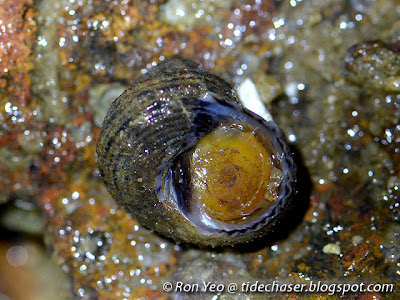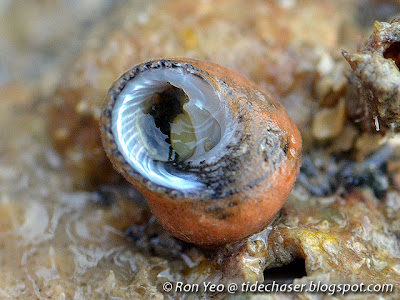The chilodonit snails are a family of small snails previously classified as top shells, but molecular genetic studies elevate them to a separate family of their own. They are generally turban-shaped, with a corneous operculum. Their shells have a nice iridescence when polished, and some are collected for making decorative items. Most species graze on algae.
I have only seen two species of chilodonit snails on our shores so far (thanks to Siong Kiat who gave tips on how to identify them!). You may want to take a look at my diagram on the parts of a snail's shell if you are not familiar with the names of the parts, so as to better understand the terms used below.

The Four-keeled Euchelus (Euchelus quadricarinatus) is a small snail about 1cm long, sometimes seen under rocks on our shores. It can be identified by having about four raised spiral cords marked with black (or dark brown) and whitish spots. Some specimens may be covered with an encrusting sponge.

The aperture has a pearly iridescence, and the operculum is yellowish and round. The columella has a small tooth, sometimes not very obvious.

The Black Euchelus (Euchelus atratus), interestingly, often does not appear black. Instead, it often has a layer of orange sponge growing over its shell. At areas not covered by the sponge, you can see the black spiral cords. It is also about 1cm long.

It has a prominent tooth on the columella, and the aperture has a pearly iridescence. The operculum is yellowish.
Snail families that resemble chilodontid snails:

Chilodontid snails are easily confused with the closely related top shells, especially for top shells that are turban-shaped. The Toothed Top Shell (Monodonta labio) above is one of the top shells that look like turban snails. Find out more about the top shells at my page on Top Shells (Phylum Mollusca: Family Trochidae) of Singapore.

Chilodontid snails can also be confused with the turban snails, as they are also turban-shaped. Most turban snails, however, have thick and hard calcareous opercula. Find out more about the turban snails at my page on Turban Snails (Phylum Mollusca: Family Turbinidae) of Singapore.
References
I have only seen two species of chilodonit snails on our shores so far (thanks to Siong Kiat who gave tips on how to identify them!). You may want to take a look at my diagram on the parts of a snail's shell if you are not familiar with the names of the parts, so as to better understand the terms used below.

The Four-keeled Euchelus (Euchelus quadricarinatus) is a small snail about 1cm long, sometimes seen under rocks on our shores. It can be identified by having about four raised spiral cords marked with black (or dark brown) and whitish spots. Some specimens may be covered with an encrusting sponge.

The aperture has a pearly iridescence, and the operculum is yellowish and round. The columella has a small tooth, sometimes not very obvious.

The Black Euchelus (Euchelus atratus), interestingly, often does not appear black. Instead, it often has a layer of orange sponge growing over its shell. At areas not covered by the sponge, you can see the black spiral cords. It is also about 1cm long.

It has a prominent tooth on the columella, and the aperture has a pearly iridescence. The operculum is yellowish.
Snail families that resemble chilodontid snails:

Chilodontid snails are easily confused with the closely related top shells, especially for top shells that are turban-shaped. The Toothed Top Shell (Monodonta labio) above is one of the top shells that look like turban snails. Find out more about the top shells at my page on Top Shells (Phylum Mollusca: Family Trochidae) of Singapore.

Chilodontid snails can also be confused with the turban snails, as they are also turban-shaped. Most turban snails, however, have thick and hard calcareous opercula. Find out more about the turban snails at my page on Turban Snails (Phylum Mollusca: Family Turbinidae) of Singapore.
References
- Oliver, A. P. H. 2012. Philip's guide to seashells of the world. Philip's, London. 320 pp.
- Tan, K. S. & L. M. Chou, 2000. A guide to common seashells of Singapore. Singapore Science Centre, Singapore. 168 pp.
- Tan, S. K. & H. P. M. Woo, 2010. A preliminary checklist of the molluscs of Singapore. Raffles Museum of Biodiversity Research, National University of Singapore, Singapore. 78 pp. Uploaded 02 June 2010.
- Tan, S. K. & R. K. H. Yeo, 2010. The intertidal molluscs of Pulau Semakau: preliminary results of “Project Semakau”. Nature in Singapore, 3: 287–296.
- Vermeij, G. J. 1993. A Natural History of Shells. Princeton University Press, Princeton, p146.
- World Register of Marine Species. 2012. Retrieved Oct 3, 2012, from http://www.marinespecies.org.

No comments:
Post a Comment